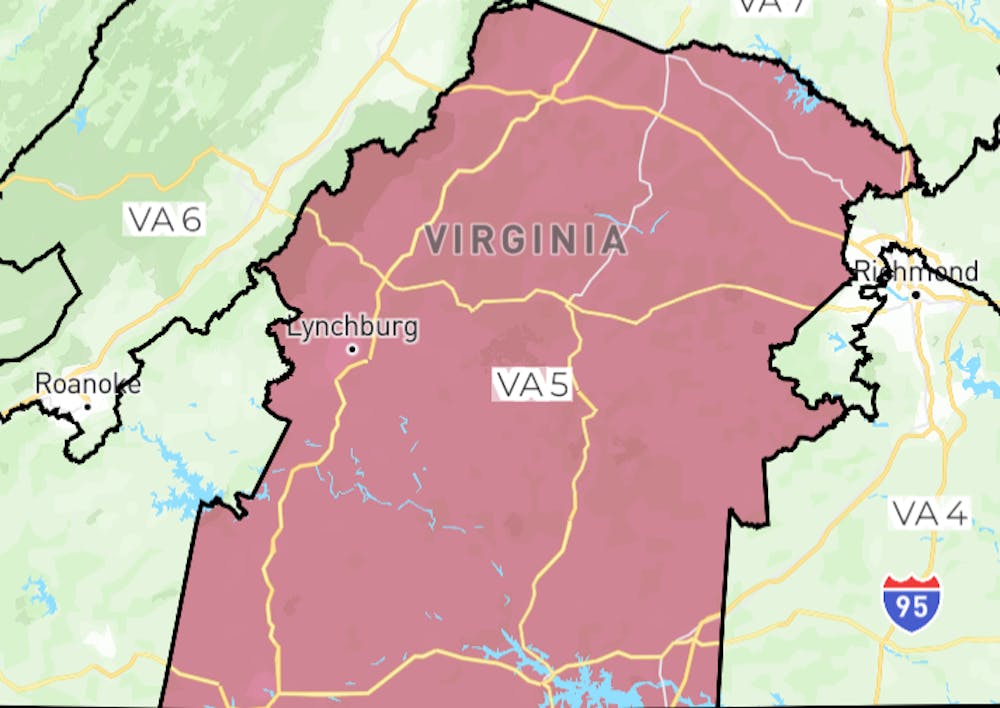From the wineries of Nelson County to the haystacks of Pittsylvania, Virginia’s 5th congressional district represents the diversity of the central and southern parts of Virginia like no other. In Charlottesville and throughout the district, however, that diversity is threatened by congressional leaders like Bob Good who exemplify a zero-sum mentality that seeks only to serve those in his party — who are overwhelmingly white. The heavy congressional redistricting that has taken place over the past few years has left residents without adequate representation, and the committee formed to address these problems — the Virginia Redistricting Commission — has failed to address this issue. With clear examples of how redistricting has failed our community seen in our district’s latest congressional pick, future commissions must be truly independent to transcend partisan politics, provide adequate representation and protect the voices of minority voters.
A federal court blocked Virginia’s congressional map in 2015 because it put too many Black voters in one district and attempted to give Hampton Roads and Richmond — two areas that are far apart geographically — the same representatives. By doing so, Black voters’ voices were kept out of other districts, thus protecting — usually Republican — incumbents and white majorities of voters elsewhere. This trend of placing rural counties and minority communities in the same district often fails to secure a representative that reflects specific, regional interests and is seen throughout Virginia even today. For example, Virginia’s 7th congressional district places the highly diverse eastern side of Prince William County with the much less diverse Tidewater and Madison County.
The problem is not that Republicans seem to be on a winning streak in Virginia. Rather the concern is that congressional maps are drawn with party interests in mind. Instead of prioritizing adequate constituent representation and uplifting diverse voters’ voices, the maps reflect intentional gerrymandering to ensure that some win and some lose, and that some never get their voices heard.
To prevent Virginia’s history from repeating itself, the Virginia Redistricting Commission was formed in 2021 to address the partisanship that clouded the congressional map making process. In reality, however, the commission failed because it was composed of eight legislators and eight citizens divided evenly among the political parties — the Commission became stuck in stalemate after stalemate. The inclusion of citizen voices in this manner did not help to prevent partisan politics because regular residents were well out of their depth in political negotiations. Neither side of the political aisle was willing to budge on what they thought best preserved their influence in the state, and in the end, the Virginia Supreme Court resorted to drawing the map itself. This resulted in minority communities throughout Virginia having their voting power watered down, where majority-minority districts — which often vote blue — became tiny blips in seas of red, making it almost impossible for these minority districts to be effectively represented in the Virginia legislature. In this way, court-ordained districting has been less than effective in remedying these inequitable trends in the crafting of voting districts.
For future redistricting efforts, Virginia needs a truly independent commission. Virginia should look to other states for what true non-partisan action looks like. For instance, Colorado’s committee has an equal number of Democratic and Republican members while also having an equal number of members unaffiliated with any party. Even more so, commission members are selected firstly by a random pool, which is then narrowed down through a series of channels so that legislators play a part in the selection process without partisanship having the final say. While Colorado’s solution is not perfect, it is far more progressive than what Virginia has now.
Other states have proven that court-appointed independent commissions are also a viable solution in terms of protecting marginalized communities’ votes. Just this year, Alabama’s Republican Party again attempted to dilute Black voter’s voices. A federal court stepped in, appointing three independent special masters who drew a map that actually preserved Black Alabamians’ voices starting in the 2024 elections, without giving special treatment to either political party.
Democrats and Republicans will most likely never draw the same lines on congressional maps, but the focus should not be on these parties — it should be on the citizens whom they represent. Having an independent commission composed of citizens that are not directly affiliated with one political party or another more effectively allows voters’ voices to be heard and actual compromise to be reached. One way to achieve truly non-partisan commissions is to leverage the independent nature of our court system. Thus, future independent commissions in Virginia should be court-appointed to ensure conflicts of interest are mitigated while also prioritizing the protection of majority-minority districts’ votes.
Ensuring that Virginia’s congressional map is fair and created without partisanship at the steering wheel is essential now more than ever. With Gov. Glenn Youngkin’s plans in education and reproductive health showing the extent of his willful ignorance of the needs of Virginians, the state risks falling back on the progress made during the former Terry McAullife and Ralph Northam gubernatorial administrations. A citizen’s redistricting commission, composed of voters and reviewed by the courts, will allow for a constitutional and non-partisan system. With these changes, Virginians can reclaim the redistricting process, push forth map proposals that reflect their interests and create a legislature that is equipped to work for communities for which it has not traditionally worked.
Arjun Iyer is a Viewpoint Writer who writes about Politics for The Cavalier Daily. He can be reached at opinion@cavalierdaily.com.







